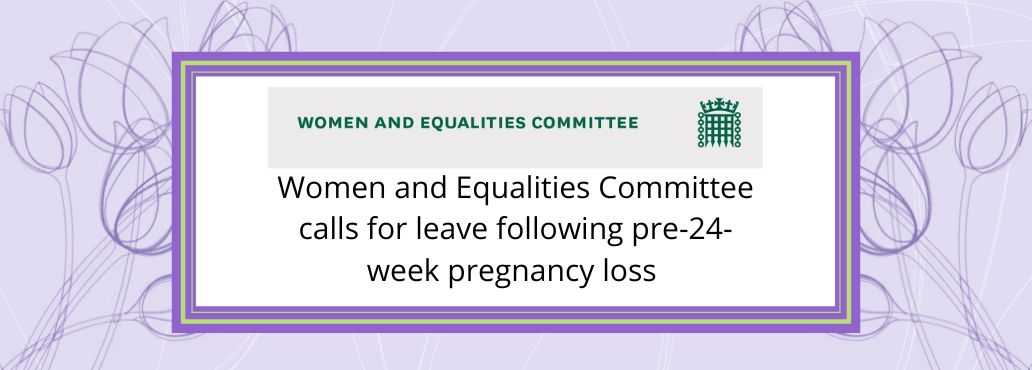
The Women and Equalities Committee (WEC), appointed by the House of Commons to examine the expenditure, administration, and policies of the Government Equalities Office and its public bodies, highlighted the lack of statutory support for individuals experiencing pregnancy loss.
More than one in five pregnancies ends before 24 weeks and many women and their partners experience this loss as a bereavement – yet current laws fail to provide the support they need. Instead, individuals are often forced to take sick leave, which the WEC describes as “inadequate” and lacking the dignity and recognition that grieving families deserve.
The report also noted that financial barriers, such as the low rate of Statutory Sick Pay, mean many are unable to take the time they need to recover. While some employers have implemented excellent pregnancy loss policies, these are not universal, leaving substantial gaps in provision.
A Call for Action
WEC Chair Sarah Owen, who shared her own experience of miscarrying at work, stated: “I was grief-stricken, not sick, harbouring a deep sense of loss. The case for a minimum standard in law is overwhelming.” Her story echoes the experiences of countless others who find themselves navigating the emotional and physical challenges of pregnancy loss without adequate support and she added: “WEC is calling on the Government to support our amendments, or bring forward its own, to ensure that all those who experience the physical and emotional pain and grief of pregnancy and baby loss are able to access the support they need.”
The proposed amendments to the Employment Rights Bill would aim to extend statutory bereavement leave to those who experience miscarriage, ectopic pregnancy, molar pregnancy, IVF embryo transfer loss, and terminations for medical reasons before 24 weeks.
The Role of The Ectopic Pregnancy Trust
The Ectopic Pregnancy Trust (EPT) contributed to this vital discussion during the WEC hearing in November. Chief Executive, Munira Oza, highlighted the frequently significant physical and emotional toll of ectopic pregnancy loss, stressing the need for statutory leave to provide those affected with compassion and support. She also emphasised the importance of ensuring ectopic pregnancy is explicitly included in communications, recognising and validating the experiences of those affected by the condition.
The WEC’s recommendations represent a vital step towards recognising the often profound impact of pregnancy loss. By introducing statutory leave, policymakers have the opportunity to provide anyone affected by pregnancy loss before 24 weeks with the time and support they need to process their experience. The EPT stands alongside those calling for this change, advocating for compassion and inclusion for all affected by early pregnancy loss.
You can read the report in full here.
Experiencing an ectopic pregnancy can bring a range of emotions and however you feel is completely valid. For many, there can be a deep sense of bereavement – whether from the loss of the pregnancy or a Fallopian tube or other personal aspects of their experience. For others however, it may not feel like a ‘bereavement’ or they may feel confused about their emotions or not use that word. It’s important to recognise and honour your feelings, whatever they may be. Our support services are here with a safe space should you need.
How you can support this campaign
Write to your MP
While a significant number of MPs have already shown their support for Sarah Owen MP’s amendments, we still need more to ensure these crucial changes are included in the Bill when it is next voted on in Parliament.
If your MP hasn’t yet supported this, emailing them to urge their backing could play a pivotal role in securing this much-needed bereavement leave for families.
To make it easier, a template email is available on the Miscarriage Association’s website, which you can personalise and send directly to your MP.
Government Responds to Calls for Pregnancy Loss Bereavement Leave
The Government has published its official response to the Women and Equalities Committee’s (WEC) report on miscarriage and bereavement leave. In it, the Government reaffirmed its acceptance of the principle that those who experience pregnancy loss before 24 weeks should have access to bereavement leave. It also committed to exploring potential amendments to the Employment Rights Bill as it moves through the House of Lords.
The WEC’s January report, chaired by Labour MP Sarah Owen, highlighted the significant gap in workplace support for women and their partners after pregnancy loss. It made a clear recommendation that statutory paid leave should be available to all those affected, stating that “the case for a minimum standard in law is overwhelming.” The report also announced plans to introduce amendments to the Government’s Employment Rights Bill and urged Ministers to support them.
In its written response, the Government acknowledged the importance of ensuring employees have the time and support they need to grieve, with Business and Trade Minister Justin Madders recognising that “bereavement is not an illness” and that pregnancy loss “needs its own special category.” While the Government has not yet fully committed to introducing statutory paid leave, it has acknowledged the need for change and pledged to continue discussions as the Bill progresses.
Sarah Owen MP welcomed the response as a step in the right direction, emphasising that pregnancy loss is a bereavement, not an illness, and that the Government’s willingness to consider legal changes is a “tangible step forward.”. If the UK introduces miscarriage bereavement leave, it would join a small but growing number of countries recognising the emotional and physical impact of pregnancy loss in employment law.
While there is still work to do, the commitment to further discussions is an important milestone in the fight for workplace rights for those affected by pregnancy loss. We will continue to follow developments as the Bill moves through Parliament.
You can read the response in full here.
